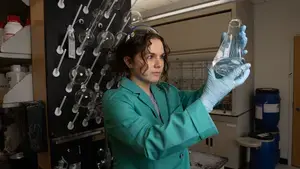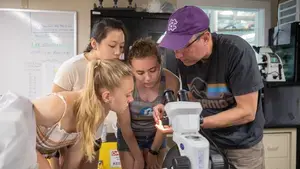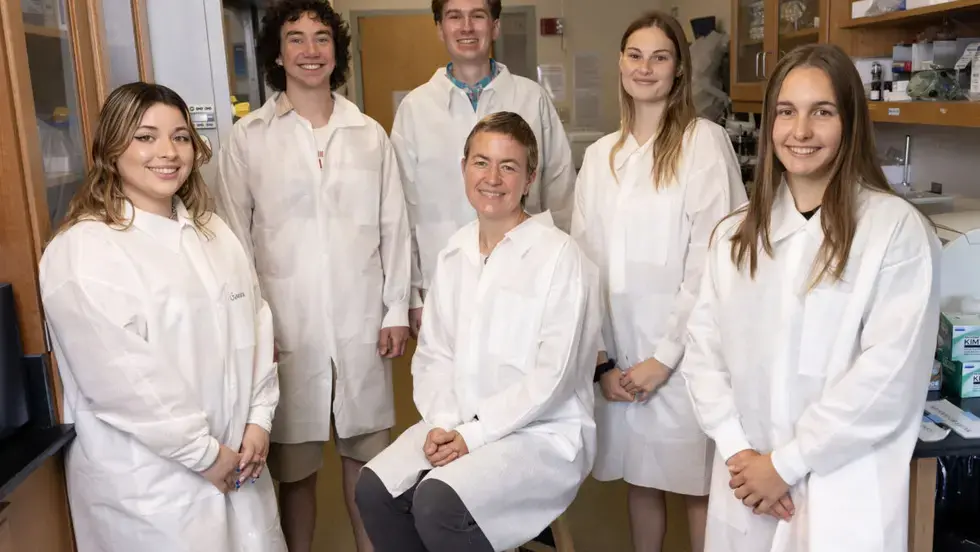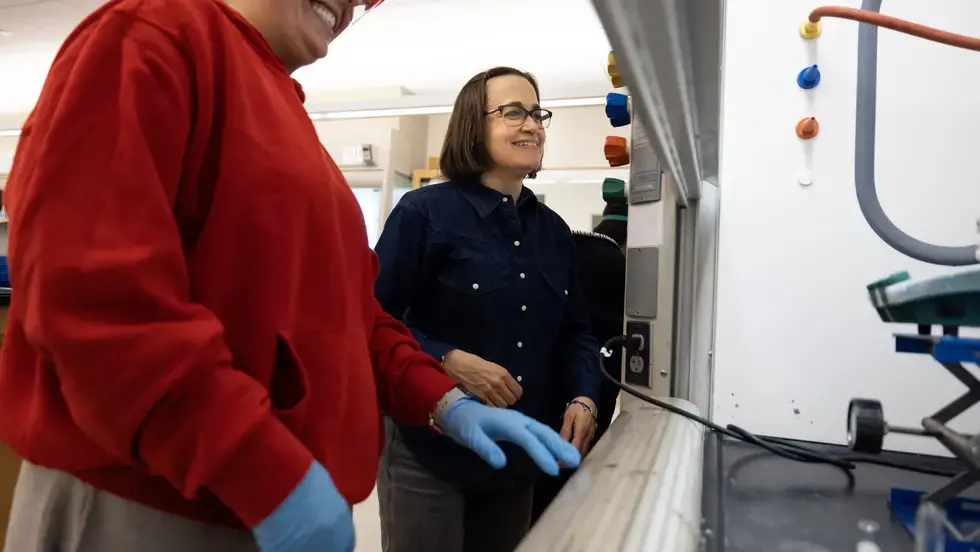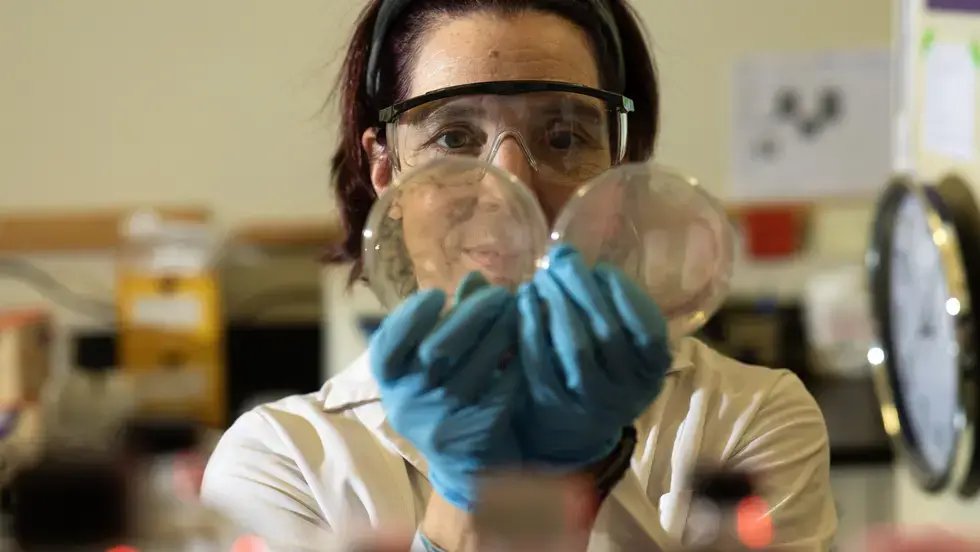
Biology
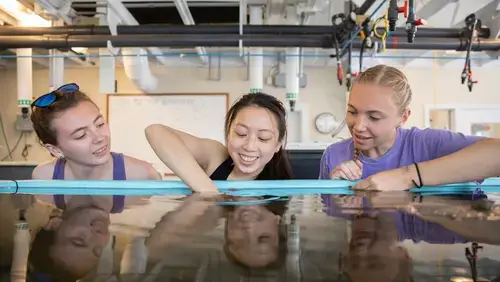
The Department of Biology is housed in the College's Integrated Science Complex. In addition to state-of-the-art campus facilities — which include confocal and scanning electron microscopes, anaerobic growth chambers, real time thermocyclers, surface plasmon resonance (SPR) and a flow cytometer — the department also makes extensive use of nearby sites for field studies that are central to ecological and evolutionary biology.
A major educational goal of the biology department is to introduce undergraduates to the excitement and methods of scientific research. Students are exposed to modern research techniques in laboratory courses, and have additional opportunities to do significant semi-independent research under the supervision of a faculty member, often for academic credit.
The curriculum of the biology major helps students develop critical thinking and analytic skills as they learn biological concepts alongside discussions of remaining unanswered questions in the field. Introductory classes solidify foundational concepts and include classroom and exploratory laboratory components. In upper-level biology courses, students choose to explore in more depth the topics that interest them most. These courses cover the major topics of the course subject and students learn how to read and discuss primary literature articles and develop oral and written communication skills. The major thus prepares students with the intellectual and hands-on skills they need to enter various career paths, in biology, medicine and beyond.
Holy Cross Biology majors enter numerous career paths after graduation. In addition to many different career options in biotech, science communication, wildlife conservation, ecology and environmental science, many attend graduate school in some area of biology or a health-related professional school (medical, dental, veterinary, physician assistant, etc.), entering top-ranked graduate or professional programs in their areas.
Areas of Study
- Cellular and Molecular Biology
- Organismal Biology
- Ecology and Evolution
Requirements
The Biology Major includes:
- Three courses in the introduction to biology sequence
- BIOL 161 , BIOL 162 and BIOL 163
- Five upper division laboratory courses across cellular and molecular biology, organismal biology, and ecology and evolution, with at least three of these classes including accompanying labs
- Cellular and Molecular Biology (BIOL 241, 261, 262, 266, 269, 301, 302, 310, 362, 392)
- Organismal Biology (BIOL 211, 212, 213, 214, 220, 223, 230, 232, 250, 285, 390, 391)
- Ecology and Evolution (BIOL 233, 235, 280, 281, 283, 287, 331, 381, 383)
- Two chemistry courses
- CHEM 181 plus either CHEM 221 or CHEM 231 (all with labs)
- A calculus course
- Calculus 1 (or the equivalent)
- A statistics course
- BIOL 275 or STAT 220
- Two additional cognate courses from an approved list across STEM departments
- CHEM 221, CHEM 222, CHEM 231, CSCI 131, CSCI 132, CSCI 135, GEOS 150, GEOS 210, GEOS 270, GEOS 310, GEOS 350, MATH 136, MATH 241, PHYS 115, PHYS 116, PSYC 221
- Students may elect to substitute an upper division biology course (beyond the required five) for one of these cognates.
Please note: Anatomy and Physiology 1 and 2 can now be counted towards the Biology major as Intermediate level courses with labs under the Organismal Biology distribution area.
One semester of research for credit may be used toward the upper division biology course requirement with lab. Students may substitute one geoscience course above the 100 level for an upper division biology course. Of the minimum total of eight biology courses required by this curriculum, at least six must be taken at Holy Cross.
Majors with AP scores in biology do not receive credit toward the minimum number of required major courses nor do they receive advanced standing. Non-major students with AP Biology scores of 4 or 5 receive natural science common credit.
Opportunities in Biology
Facilities
The department has the physical facilities and state-of-the-art equipment to allow students to be exposed to a variety of exciting and current techniques used in both laboratory and field studies. This exposure occurs routinely as an integral part of course labs and in independent student research. Equipment within the department includes: tissue and cell culture facilities, a Departmental Microscopy Facility with live cell fluorescence, laser scanning confocal and scanning electron microscopes, real time thermocyclers, surface plasmon resonance (SPR), a flow cytometer, growth chambers in which a variety of organisms can be grown or tested in controlled environments, a motorized jon boat and equipment for sampling of aquatic life and for making physical and chemical measurements of environmental conditions and greenhouses used to grow plants and certain animals in conjunction with field studies.
Research
The biology department is very proud of the research opportunities available to students. Each spring, students involved in research, both on campus and off campus, present their studies at a poster session as part of the Academic Conference. Each year, a number of student research projects are published in scholarly journals with the students as co-authors. Moreover, many faculty also take students to national meetings of professional societies, with full financial support from the College.
Seminar Series
We understand how important it is for our students to make connections between the content that they are learning in their classes and real-world science applications. The Schaeffer family seminar series is a cornerstone of our efforts to provide our students with opportunities to connect with us, with other students, with alums and with other professionals in our discipline. Scientists are invited to campus to talk as part of this seminar series throughout the academic year, covering a wide variety of biological research topics and enabling our students to better understand the connections between different areas of research, as well as between different subdisciplines of biology.
Study Abroad
Many Biology majors study abroad for one or two semesters in their Junior year. Popular programs with a biology focus include: Organization for Tropical Studies (OTS) in Costa Rica or South Africa, School for Field Studies (SFS) with locations in the Caribbean, Africa, Central America and Australia/New Zealand, and SEA Semester with travel through the Caribbean or Polynesia.
Meet Your Department Chair

